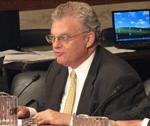A Senate panel heard testimony Thursday that a reduction in the Renewable Fuel Standard would hinder progress toward next generation biofuels.
 Deputy Assistant Energy Secretary Steven Chalk told the Senate Environment and Public Works clean air subcommittee that keeping the current RFS policy in place is “critical to ensuring growth in all parts of the biofuels supply chain, from feedstocks, to biorefineries, to infrastructure, including pipelines.”
Deputy Assistant Energy Secretary Steven Chalk told the Senate Environment and Public Works clean air subcommittee that keeping the current RFS policy in place is “critical to ensuring growth in all parts of the biofuels supply chain, from feedstocks, to biorefineries, to infrastructure, including pipelines.”
The hearing was focused on implementation of the expanded RFS, which was passed by Congress and signed by the president in December. The new standard increases the amount of renewable fuels required up to 36 billion gallons by 2022, with 16 billion of that to come from cellulosic sources.
Environmental Protection Agency official Robert J. Meyers testified that as the agency is working to implement “RFS2” they are considering the potential impacts of the standard and working closely with stakeholders at all levels. He noted that the agency received over 15,000 comments on the request by Texas Governor Rick Perry to waive part of the RFS and they will be making a decision later this month on the request.
 DuPont vice president for technology John Pierce told the committee that the expanded RFS is an attainable goal, both in terms of corn ethanol and cellulosic. “In fact, there are multiple technology developers intending to produce cellulosic ethanol in pilot or demonstration quantities from a range of feedstocks over the next 24 months. The economics and carbon performance of grain ethanol continues to improve as well, as does agricultural productivity and sustainability in the US. These trends suggest that while the RFS targets are aggressive, as they should be, they are not out of reach.”
DuPont vice president for technology John Pierce told the committee that the expanded RFS is an attainable goal, both in terms of corn ethanol and cellulosic. “In fact, there are multiple technology developers intending to produce cellulosic ethanol in pilot or demonstration quantities from a range of feedstocks over the next 24 months. The economics and carbon performance of grain ethanol continues to improve as well, as does agricultural productivity and sustainability in the US. These trends suggest that while the RFS targets are aggressive, as they should be, they are not out of reach.”
Read all the testimony here on the Senate subcommittee website.

